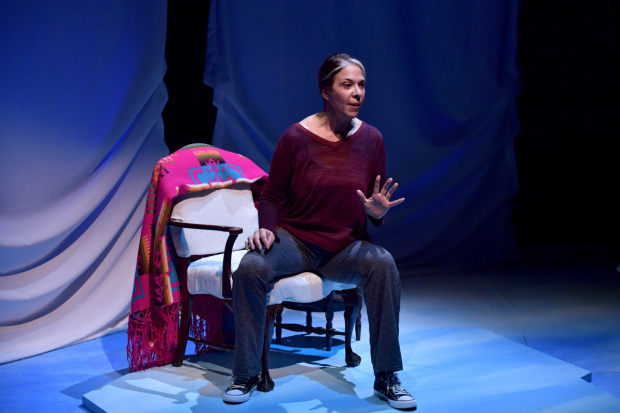Mala

(© Paul Marotta)
Melinda Lopez's deeply affecting and personal solo memory play, Mala, is set during the period when she was the primary caretaker for her aged and dying parents. Her varied identities (which also include wife and mother) were often in conflict as she tried to get through each day.
In this world premiere, produced by ArtsEmerson, Cuban-American playwright and actor Lopez speaks directly to the audience without erecting either the theatrical fourth wall or any other obstacle to conceal her reactions. As narrator, she takes us through the decisions she made while attending to her mother after her father had died, reminding the viewers of their own lives, so they will understand her behavior. "The most ordinary thing you can do is die, right? Everyone does. And the second more ordinary thing is to bear witness," she says.
The titles of the anecdotes she relates, and the translations of the conversations she speaks in Spanish, are projected onto the trio of screens that back the simply set stage. Lopez becomes the other members of her family: her elder sister who was too busy to visit their father during the last few days before his death, and a younger sister, who had helped care for him. Lopez's daughter is an important figure, and her husband makes an appearance, but the central characters are Lopez and her mother, and the major theme is the description of their relationship. A lifetime of loving and being pushed away has taught Lopez how not to bring up her own daughter.
Mala, the title of the play, means "bad" in Spanish, "not that you have done a bad thing but that you are bad to the core," Lopez explains. Her mother used the word as a visceral attack, especially when she was frustrated at needing help.
Lopez's mother was born in Cuba, the eldest of eight children. She once stared down her father when he wanted to set the broken collar bone of a younger sister to save the money for the doctor. Lopez's mother was only 15 at the time of the incident, but she carried her sister to the hospital herself. Lopez's parents married in Cuba, but after Castro came into power, they immigrated to America. The couple was together for 72 years before her father died.
After her parents became too old to live alone, Lopez brought them to live in an apartment in her house, where she could hear every argument and every emergency that needed her intervention. She takes us through her feelings of guilt, exhaustion, and impatience with her parents' irrational demands and her fears about losing them, finally admitting, "I love her so much, but I can't do this anymore."
As a playwright, Lopez is a cautious wordsmith, fashioning her language to create images that not only convey her feelings, but that stand alone as metaphors for the universality of her experience. As an actress, under the sensitive direction of David Dower, she expresses her changes of mood and emotion without artifice, as if she were reliving the moments of the anguish and the joy of loving — and understanding — another person so fully. Her finely calibrated performance serves to underline the grief she felt at her mother's passing, but writing the play and sending it out into the world has allowed her to admit the relief that came when her role as the "good daughter" ended.











